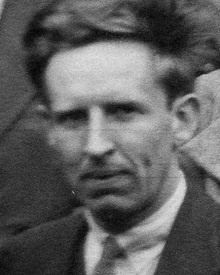Frases célebres de John Desmond Bernal
Original: «The majority are not constrained nor hampered by reasonable methods of determining their main areas of work. They accept and respond to team working on the scale needed to make measurable progress with the various problems».
Fuente: Chemistry and Industry, Parte 2. Colaborador Society of Chemical Industry (Great Britain). Editorial Society of Chemical Industry, 1976. p. 1.015.
Original: «Finally, consciousness itself may end or vanish in a humanity that has become completely etherealized, losing the close-knit organism, becoming masses of atoms in space communicating by radiation, and ultimately perhaps resolving itself entirely into light. That may be an end or a beginning, but from here it is out of sight».
Fuente: The End Of Science: Facing The Limits Of Knowledge In The Twilight Of The Scientific Age. Autor John Horgan. Editorial Hachette UK, 2015. ISBN 9780465050857. https://books.google.es/books?id=81U4DgAAQBAJ&printsec=frontcover&dq=The+End+Of+Science:+Facing+The+Limits+Of+Knowledge+In+The+Twilight+Of+The+...&hl=es&sa=X&ved=0ahUKEwiTqaqL-cjgAhVNzRoKHXJDA7cQ6AEIKDAA#v=onepage&q=Finally%2C%20consciousness%20itself%20may%20end%20or%20vanish%20in%20a%20humanity%20that%20has%20become%20completely%20etherealized%2C%20losing%20the%20close-knit%20&f=false
John Desmond Bernal: Frases en inglés
Bernal (1937) "Psycho-Analysis and Marxism" in: The Labour Monthly, Vol. 19, July 1937, No. 7, pp. 435-437. Online here http://www.marxists.org/archive/bernal/works/1930s/psycho.htm on Marxists Internet Archive (2010).
Fuente: The Social Function of Science (1939), p. 249
Fuente: The world, the flesh & the devil (1929) (1969), p. 48 as cited in: C. K. Ogden (1995) Psyche. 10. 1929/30 p. 116
“If science were communism, was it also not possible that communism could itself become a science?”
Attributed to Bernal in: Gary Werskey (1978) The visible college. p. 137
Bernal (1930s) "Labour Monthly Pamphlets, No. 6" (No date). Online ( here http://www.marxists.org/archive/bernal/works/1930s/engels.htm) on Marxists Internet Archive (2008).
Fuente: The Social Function of Science (1939), p. 415-416. Chapter XVI. THE SOCIAL FUNCTION OF SCIENCE. The Transformation of Science
Fuente: The world, the flesh & the devil (1929) (1969), p. 66
Bernal (1967) The Origin of Life, p. xv. Preface
“Hogben's Science for the Citizen would be an admirable text-book for such teaching.”
Fuente: The Social Function of Science (1939), p. 260
J.D. Bernal (1937) "Dialectical Materialism and Modern Science" in: Science and Society, Volume II, No. 1, Winter 1937; Online ( here http://www.marxists.org/archive/bernal/works/1930s/dsams.htm) on Marxists Internet Archive (2002).
Fuente: The Social Function of Science (1939), p. 306-307. Chapter SCIENTIFIC COMMUNICATION. The Function of Scientific Publication. See also World Brain
J.D. Bernal (1959/1969) Science in history Vol 3. p. 862; cited in: Ludwig von Bertalanffy (1968) General System Theory. p. 5-6
Fuente: The world, the flesh & the devil (1929) (1969), p. 63
Fuente: The Social Function of Science (1939), p. 246 : How such a method of teaching could become an integral part of general education is sketched by H. G. Wells' British Association address, "The Informative Content of Education," reprinted in World Brain (Mathuen, 1938).
Fuente: The world, the flesh & the devil (1929) (1969), p. 3. Intro of part I. The Future ( online http://www.marxists.org/archive/bernal/works/1920s/soul/ch01.htm)
Fuente: The world, the flesh & the devil (1929) (1969), p. 68
Fuente: The Social Function of Science (1939), p. 292
“[S]cience has so changed its nature over... human history that no definition could be made to fit.”
Preface
Science in History (1954)
“It would be as one-sided to assess the effects of science on society as of society on science.”
Preface
Science in History (1954)
